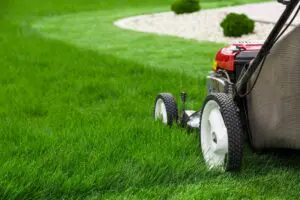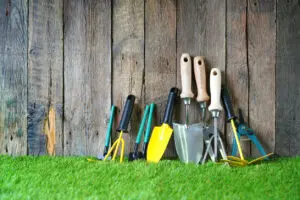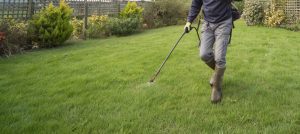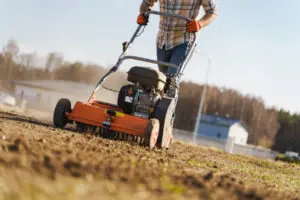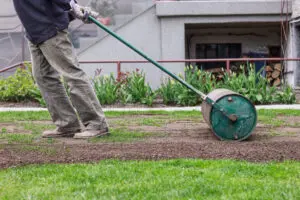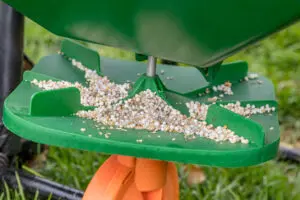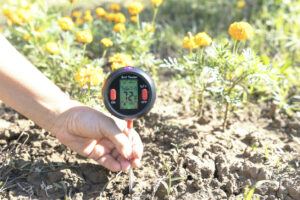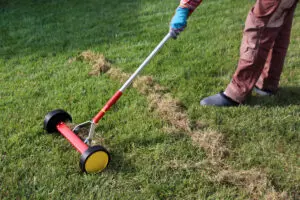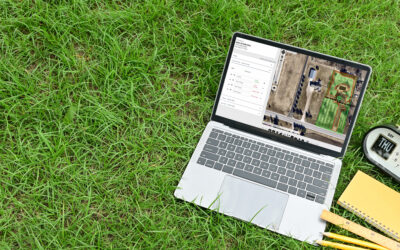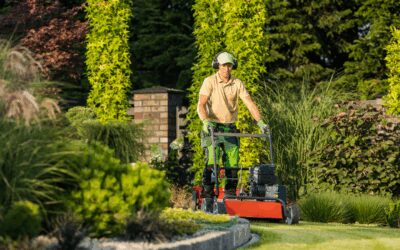From attracting lawn care customers to maintaining a professional appearance, starting your own lawn care business requires strategic planning. One critical factor that can make or break your venture is your choice of lawn care equipment and landscaping tools. These tools not only streamline your operations but also reflect your commitment to delivering quality services. In this article, we’ll delve into the things needed for a lawn care business, including the must-have equipment and tools. Whether you’re a budding entrepreneur or looking to enhance your existing lawn care or landscaping business, our insights will pave the way for your success.
From powerful lawnmowers to precise weed trimmers, choosing the right equipment is crucial. Consider your budget and services offered to make informed decisions. Here’s a comprehensive lawn care equipment list of what you’ll need.
Our List of Essential Tools and Equipment Needed for a Lawn Care Business
1. Lawn Mower
It’s impossible to run a lawn business without a dependable mower. The types of lawnmowers you’ll need depend on the types of lawns you will service. For smaller areas or difficult terrain, you’ll want to look at push mowers. Riding mowers and zero-turn mowers are better for larger areas. Mower prices vary greatly depending on what you’re in the market for – from $200 for a basic push mower to nearly $10,000 for a commercial-grade zero-turn riding mower.
2. Trimmer/Edger
Trimming and edging are vital for a pristine lawn. Hedge trimmers sculpt bushes, while string trimmers define edges. You can opt for gas, electric, or cordless models based on mobility and convenience. Once again, there’s a wide price range; trimmers range from around $50 for a basic model to nearly $500, while edgers start in the $50 range and go all the way up to nearly $5000 for a commercial-grade walk-behind model.
3. Leaf Blower
Leaf blowers are necessary for efficient debris removal at job sites. Handheld models are good for smaller areas, while backpack units work better for larger expanses and more extensive cleanups. Prices vary, with effective models ranging from $75 to more than $1500, depending on size and features.
4. Hand Tools
For precision lawn care and landscaping work, you’ll need a variety of hand tools, including pruning shears, garden rakes, hand trowels, hand saws, and shovels. Prices for decent quality hand tools typically span from $10 to $50, presenting accessible options for every lawn care and landscaping business.
5. Sprayer
Sprayers play a vital role in the application of fertilizers, pesticides, and herbicides, promoting insect control and healthy growth. Choose from handheld sprayers for smaller areas, backpack sprayers for mobility, or tow-behind sprayers for larger spaces. Effective sprayers for your business range from $50 for basic models to $500 for durable, efficient options, ensuring effective insect controls and plant care.
6. Lawn Aerator
Lawn aerators are another necessary tool, enhancing soil health and promoting lush growth. Spike aerators puncture the soil, allowing air and nutrients to reach the grassroots, while plug aerators remove plugs of soil for better water absorption. Effective lawn aerators for your business typically range from $100 for basic models to $4000 for heavy-duty, professional-grade options.
7. Lawn Roller:
A lawn roller is a versatile tool used in lawn care for flattening uneven ground and compacting soil. It consists of a cylindrical drum typically made of metal or heavy-duty plastic, attached to a handle or towed behind a lawn tractor. Lawn rollers are commonly used after seeding or sodding to ensure good seed-to-soil contact and promote healthy grass growth. By smoothing out bumps and indentations in the soil, a lawn roller helps create a level surface for mowing and prevents uneven grass growth. Lawn rollers come in various sizes and weights, with prices ranging from affordable manual models to larger, more expensive tow-behind options suitable for commercial use.
8. Broadcast Spreader:
A broadcast spreader is an essential tool for evenly distributing seeds, fertilizers, and other granular materials across a lawn or garden area. Also known as a rotary spreader, it operates by spinning a disc or impeller to disperse the material in a wide pattern as the user walks or pushes the spreader. This ensures uniform coverage and prevents clumping or over-application, resulting in a healthier and more consistent lawn.
9. Soil Test Kit:
A soil test kit is an indispensable tool for assessing the health and fertility of the soil in a lawn or garden. It typically includes various tests for measuring important factors such as pH levels, nutrient content, and soil composition. By analyzing these parameters, lawn care professionals can determine the specific needs of the soil and tailor their fertilization and amendment practices accordingly. Soil test kits are easy to use and provide quick and accurate results, allowing users to make informed decisions about soil management and nutrient supplementation. They are available at garden centers, hardware stores, and online retailers, with prices ranging from budget-friendly basic kits to more comprehensive and advanced testing options.
10. Lawn Dethatcher:
A lawn dethatcher, also known as a power rake or scarifier, is a specialized tool used to remove thatch buildup from the surface of a lawn. Thatch is a layer of dead grass, roots, and other organic matter that accumulates between the soil and the green vegetation. While a thin layer of thatch can be beneficial for the lawn, excessive buildup can prevent air, water, and nutrients from reaching the grassroots, leading to poor drainage, compacted soil, and reduced turf health. A lawn dethatcher works by cutting through the thatch layer and lifting it to the surface, where it can be easily removed with a rake or lawn sweeper. This process helps to improve soil aeration, promote deeper root growth, and enhance the overall vigor of the lawn.
11. Wheelbarrow or Garden Cart:
A wheelbarrow or garden cart is an indispensable tool for transporting heavy materials such as soil, mulch, plants, and landscaping equipment around the yard. It consists of a shallow or deep basin mounted on a single or dual-wheel axle, with handles for pushing or pulling the cart. Wheelbarrows and garden carts come in various sizes, materials, and designs, including traditional metal or plastic models and more advanced ergonomic designs with pneumatic tires and convertible configurations.
Lawn Care Equipment Maintenance
Once you’ve invested in the proper equipment for your lawn care business, you’ll want to protect that investment. Regular maintenance is key to prolonging the lifespan and optimizing the performance of your equipment. Consistent care involves cleaning tools after each use, sharpening blades for precise cuts, and lubricating moving parts to prevent wear and rust. Scheduling professional servicing and repairs ensures timely detection and resolution of potential issues. When the seasons change, remember to winterize your lawnmowers by draining fuel and storing them properly. Routine equipment care includes checking oil levels, replacing air filters, and inspecting belts. Maintenance tools like a blade sharpener, cleaning brushes, lubricating oil, and an air compressor contribute to reliable and efficient operations, ultimately preserving your investment and ensuring a successful lawn care business.
Lawn Equipment Storage Facility
To safeguard your valuable tools and equipment and ensure their longevity, you’ll need a dedicated storage facility. Protecting lawn care equipment from the elements, theft, and damage preserves its performance and extends its lifespan, ultimately reducing replacement costs. A well-organized storage space also enhances operational efficiency, allowing easy access and maintenance. By providing a secure and climate-controlled environment, a storage facility contributes to the smooth functioning and success of your lawn care business.
Lawn Care Truck and Trailer
You’ll need reliable transportation to get your crews, equipment, and materials to job sites, like a truck or utility trailer with ample hauling capacity. Consider factors like load capacity, maneuverability, fuel efficiency, and the ability to secure your gear for safe transport. A truck provides versatility for daily operations, while a trailer offers dedicated space for larger equipment.
Lawn Care Safety Equipment
It’s absolutely crucial to ensure the safety of your technicians in the field, so you’ll need the proper safety equipment. Eye protection such as safety goggles will shield against debris and chemicals, while ear protection like ear plugs or earmuffs reduces noise exposure. Steel-toed work boots protect the feet, and gloves protect hands while handling sharp tools, chemicals, or rash-causing plants like poison ivy. Crew members may need hard hats for head protection or high-visibility clothing, depending on the job requirements. Respiratory protection, sunscreen, and first aid kits round out a comprehensive safety setup. For specific tasks, knee pads, safety harnesses, and fire extinguishers are also important.
You might not think of software as “equipment,” but it can be a transformative tool that enhances efficiency, production, and cash flow. With features like optimized routing, your software can help your crews save time and fuel costs. Estimating tools provide accurate quotes, improving client satisfaction and reducing guesswork. Invoicing functionalities expedite payment processing, while Customer Relationship Management (CRM) capabilities manage client data and interactions. Marketing modules help target audiences and expand outreach. From schedule management to real-time job tracking, the right lawn care software will optimize operations, boost productivity, and ultimately increase revenue.
Learn How RealGreen’s Lawn Care Software Can Streamline Your Business Processes
RealGreen’s lawn care software is the tool you need to automate day-to-day business functions, giving you more time to run and grow your business. We started as a lawn care company, so we understand your business in a way our competitors don’t—our software and solutions are designed specifically for the green industry. Get a free demo today to find out how we can help your business thrive!
FAQs
What is the best lawn care equipment for starting a business?
The best lawn care equipment for starting a business depends on factors such as the size of the lawns you’ll be servicing, your budget, and the specific services you’ll offer. However, some essential tools include a reliable lawn mower, trimmer/edger, leaf blower, hand tools, sprayer, and lawn aerator.
What equipment is necessary for cutting grass professionally?
To cut grass professionally, you’ll need a high-quality lawn mower, such as a push mower for smaller areas or a riding mower for larger spaces. Additionally, a trimmer/edger is essential for precision trimming along edges, fences, and obstacles.
How can I maintain my lawn care equipment for optimal performance?
To maintain your lawn care equipment for optimal performance, it’s essential to clean tools after each use, sharpen blades regularly, lubricate moving parts, and schedule professional servicing and repairs as needed. Additionally, winterizing lawnmowers by draining fuel and storing them properly during the off-season helps prolong their lifespan.
Can software enhance efficiency in a lawn care business?
Yes, lawn care software can be a transformative tool that enhances efficiency, production, and cash flow in a lawn care business. Features like optimized routing, estimating tools, invoicing functionalities, CRM capabilities, and marketing modules can streamline operations, boost productivity, and increase revenue.
Where can I find reliable lawn care software for my business?
RealGreen’s lawn care software is designed specifically for the green industry, offering automated business functions tailored to the needs of lawn care companies. You can get a free demo today to see how RealGreen’s software can streamline your business processes and help your business thrive. Schedule a free demo now!

